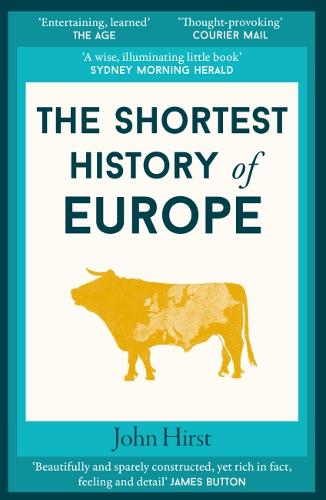
In this is an entertaining, whistle-stop overview, the late John Hirst explores key drivers and themes in European history from classical times to the present day. As the book’s title implies, this is in no way a detailed history, but more an attempt to convey a general idea of how Europe turned out the way it did.
More than once reading this book, I was reminded of Sellar and Yeatman’s parody classic, 1066 and All That, which purports to include “all the History you can remember”. Hirst’s necessary brevity occasionally borders on the comic, with people suddenly waking up one morning to find themselves in a new historical era. But this is not intended as a criticism: the whole point of this book is to show how key ideas and events linked together, sending European history on its unique trajectory.
Hirst immediately identifies the three key drivers that he believes affected European history: classical Greek and Roman culture; Christianity; and the culture of the Germanic tribes that moved into former Roman territories in the early Medieval period. He then goes on to describe how these drivers interacted and evolved into other drivers. For example:
- how, after the decline of the western Roman Empire, the Christian church became Roman, filling administrative gaps, and conserving classical knowledge;
- how the Germanic tribes in former Roman territories gradually became Christian, supporting the church;
- how Christianised Germanic leaders embraced the classical knowledge preserved by the church, eventually becoming knights, then crusaders;
- how the Romanised church’s conservation of (and devotion to) classical knowledge became a key driver of the Renaissance;
- how Germanic religious scholars eventually realised the church’s devotion to classical thinking had made it too Roman, meaning it was paying insufficient attention to biblical teaching; and how this realisation brought about the Protestant Reformation;
- how, as people explored classical knowledge during the Renaissance, they began to realise some classical knowledge was incorrect; and how this realisation led to the Scientific Revolution, and, later, the Enlightenment;
- how the Enlightenment became a driver for the French Revolution and the Industrial Revolution;
- how a reaction against the horrors of the French Revolution and the Enlightenment ideals of reason and progress led to Romanticism, which would eventually lead to the embracing of nationalism;
- …and so on!
I suspect many professional historians might scoff at this book’s attempt to cover such a vast subject in such a small space, but it certainly meets the brief described in its title to provide us with the shortest history of Europe.
- Buy this book from Bookshop.org (UK) and help tax-paying, independent bookshops.
- Buy this book from Amazon.co.uk
- Buy this book from Amazon.com

Leave a Reply